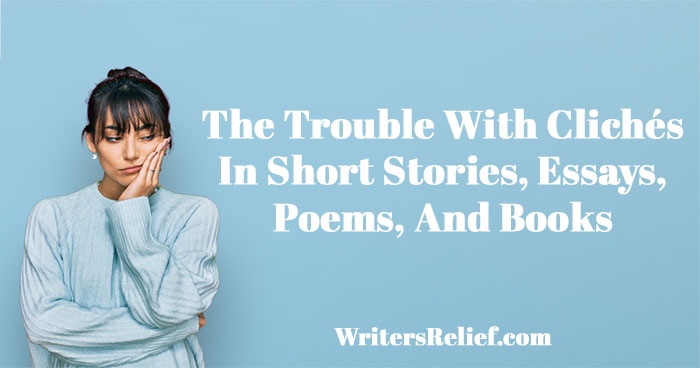
Updated October 2023
The trouble with clichés in creative writing (short stories, poems, books, and personal essays) is that they’re so spot-on. They can describe exactly what you’re trying to say in a way that everyone can understand. So, for instance, if his hands are softer than a baby’s bottom, most people, including literary agents and editors, can relate—there aren’t many things softer in this world. When your verse describes the fragile state of romance as delicate as a flower, it’s a phrase that sums up exactly how you are feeling, no matter how threadbare and great the risk that it may not get your poetry published.
People speak quickly and pepper their everyday speech with clichéd phrases that were, at one time, original and fresh but have been used for so long that their shiny surfaces have become dull. This is perfectly acceptable. But there are no excuses for letting clichés dull your stories and essays. In speech, we would feel awkward taking the time to come up with an original metaphor for how we are feeling. But no such excuse exists for the writer, who presumably has the time to mull over word choices and should not rely on the old “tried and true” phrases that are, in actuality, old and tired.
Clichés are analogies that have been overused. They are easy to identify—ask anyone to fill in the blanks below, and you’ll find no hesitation in their answers:
He was cool as a _________.
She was as pretty as a ___________.
The soldier was gone but not __________.
But sometimes a clichéd phrase is so ingrained in our everyday speech that it’s hard to spot. “Hushed courtroom,” “laid to rest,” and “emotional roller coaster” are all clichés that slip easily into our conversations and sometimes into our writing, so when proofreading your creative writing, keep an eye out for them. Better yet, ask someone else, like a writer’s group, to review your work.
A manuscript peppered with clichés proclaims, “I am the product of a lazy thinker! I am uninspired and unoriginal!” At least that’s how an editor is going to perceive it, and that’s not what you want. Add some flavor to your prose and come up with some original turns of phrase. Do you have a dark basement in your haunted house? As tempting as it is to use black as night, sin, coal, pitch, or tar, come up with something else to convey the depths of the basement’s darkness—something you don’t hear or read every day—and impress your editor. Your readers will appreciate the excitement of a fresher phrase as well.
In creative writing the rule is: there are no hard and fast rules. And this also applies to the use of clichés. The general consensus is to avoid using them at all, but they can be effectively used in characterization. If, for example, you want to develop a character who is shallow and unimaginative, let him speak in clichés. This will help the reader identify your character as someone with an uninspired personality. Often characters employ clichés in their speech because, well, clichés are handy and realistic speech is full of them. Your hillbilly may be full of homespun metaphors, and this can work if they’re confined to his dialogue.
Most clichés come in the form of metaphors (“hotter than blazes,” “slippery as an eel”), but they can also be forms of greeting (“how’s it going”) or clichéd ideas, such as Santa’s twinkling eyes or stomachs tied up in knots. And they can also be plotlines. In horror movies we all know that the couple who slips off to be alone will be the first to be murdered. And in the action flick, the bad guys fire off round after round, missing everyone, but the hero cop fires one shot and instantly kills the leader of the gang. In romance films or books, if the leading lady has an instant and strong dislike for the handsome stranger, they will inevitably end up in a passionate relationship.
If elements of your plot are vaguely familiar, or your beta reader easily predicts what will happen next, you may have a cliché on your hands. Watch for the tired and predictable, and make changes to keep things creative and interesting. And go over your writing with a fine-tooth comb to uncover any clichés that have crept in. They’re sneaky little buggers. If you need help finding an honest and objective viewpoint for your writing, a critique partner may be the answer.
Once you’ve gotten all your ducks in a row, call us! Writer’s Relief is committed to offering the best submission services to the writing community.

















This all makes a lot of sense, I have tried writing without cliches this is not so easy, though using cliches is nit easy either
I agree totally, and don’t the little beggars sneak in cleverly. When I was small I thought a fine-tooth comb was a fine comb for your teeth. An alternative to a toothbrush… what a hyphen can do!